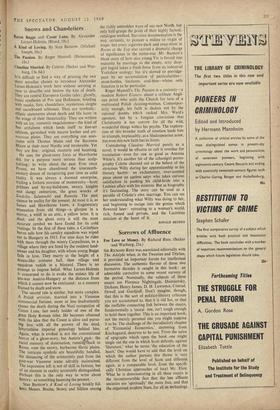Snows and Chandeliers
Baron Bagge and Count Luna. By Alexander Lernet-Holenia. (Blond, 18s.)
les difficult to find a way of praising the two short novellas chosen to introduce Alexander Lernet-Holenia's work here without seeming at once to describe and bestow the kiss of death. They are central European Gothic tales: ghostly, ironic syntheses of Poe and Hoffmann, bristling With masks, furs, chandeliers, mysterious sleighs and snowbound schlosses. They are symbolic: elliptic statements about death and life loom in the wings of their theatricality. They are written With an icy, romantic exquisiteness—the kind of fine artfulness which lends itself to fine-art editions, garnished with mauve leather and art- nouveau plates. They are everything one asso- ciates with Thomas Mann and the Baroness Blixen at their most Nordic and intolerable. Yet they are fine: original, masterly and haunting.
He uses the ghost-story form as Hawthorne did, for a purpose more serious than scalp- tickling: to write about the past. Ever since Proust, we have abandoned the nineteenth- century dream of recapturing past time as solid reality. It was always a doomed enterprise, trailing a forlorn moraine of monstrosity—Scott prithees and by-my-halidoms, sweaty knights and slangy centurions, the great wrecks of Sordello, Salammb6 and Roniola. The past cannot be reality for the present. At most it is, as James and Hawthorne knew, a fragmentary emanation from old things—a glimpse in a Mirror, a whiff in an attic, a yellow letter. It is dead; and the ghost story is still the most accurate symbol we have found for its cold visitings. In the first of these tales, a Carinthian baron tells how his cavalry squadron was wiped out in Hungary in 1915. For nine days he rides With them through the wintry Carpathians, to a village where they are feted by the resident land- owner and his daughter, with whom young Bagge falls in love. They marry at the height of a dream-like costume ball, then village and squadron vanish in a blizzard. There is no attempt to impose belief. What Lernet-Holenia IS concerned to do is evoke the extinct life of pre-war Austria-Hungary at the distance from Which it cannot now be extricated: as a memory framed by death and snow. The second tale is similar, but more complex. A Polish arriviste, married into a Viennese commercial fortune, more or less inadvertently causes the death during the Nazi occupation of Count Luna, last seedy holder of one of the
great Holy Roman titles. He becomes obsessed With the idea that the Count is alive and pursu- ing him with all the powers of the dead, labyrinthine imperial genealogy behind him. Again, what is evoked is not the conventional horror of a ghost-story, but Austria's Joast: the racial memory of domination, runnianack to Rome, over the snowy, barbarous Slavic plains. The intricate symbols are beautifully handled, the distancing of the aristocratic past from the Post-war Viennese scene adroitly maintained. The impression left is not of skill in fantasy, but of an element in reality accurately distinguished. Perhaps this is the only way to write about history: as something haunting the present.'
Stan Barstow's A Kind of Loving briskly fol- lows Messrs. Braine, Storey and Sillitoe among the richly untrodden ways of our new North, but only half-grasps the point of their highly factual, catalogue method. Baconian documentation is the way, certainly, to pioneer a milieu so virgin of maps; but every cigarette-pack and soap-sliver in Room at the Top also carried a dramatic charge of significance in the status-war. Mr. Barstow's bleak story of how nice young Vic is forced into maturity by marriage to the empty, sexy shop- girl Ingrid takes a fresh force from its industrial Yorkshire ecology; but it's slowed to porridge- pace by an accumulation of particularities- stout-bottles, linoleum, coal-bins—whose only function is to be particular.
Roger Manvell's The Passion is a curiosity—a modern Robert Elsmere about a celibate Angli- can priest who quits the Church for love of a maltreated Polish cleaning-woman. Contempor- arily enough, his faith is shaken not by the rational doubts which racked Mrs. Ward's apostate, but by a Jungian conviction that Christianity is too narrow for all the wild, wonderful things within his psyche. The explora- tion of this broader truth of emotion leads him to triumph, implausibly, as a Shakespearian actor, but even this new faith has its limits.
Considering Claudine Married purely as a novel, it would be effusive to call it overdue for translation—even for one as good as Antonia White's. It's another bit of the schoolgirl porno- graphy Colette churned out at the behest of the atrocious Willy during her apprenticeship in his literary harem : an exclamatory, over-scented piece about an ageless satyr who takes curious satisfaction in pushing his child-bride into a Lesbian affair with his mistress. But as biography it's fascinating. The story can be read as a parable of Colette's own marriage. You can see her understanding what Willy was doing to her, and beginning to escape into the genius which flowered later: retreating to a woman's world, rich, fumed and private, and the Lucretian stoicism at the heart of it.
RONALD BRYDEN


































 Previous page
Previous page